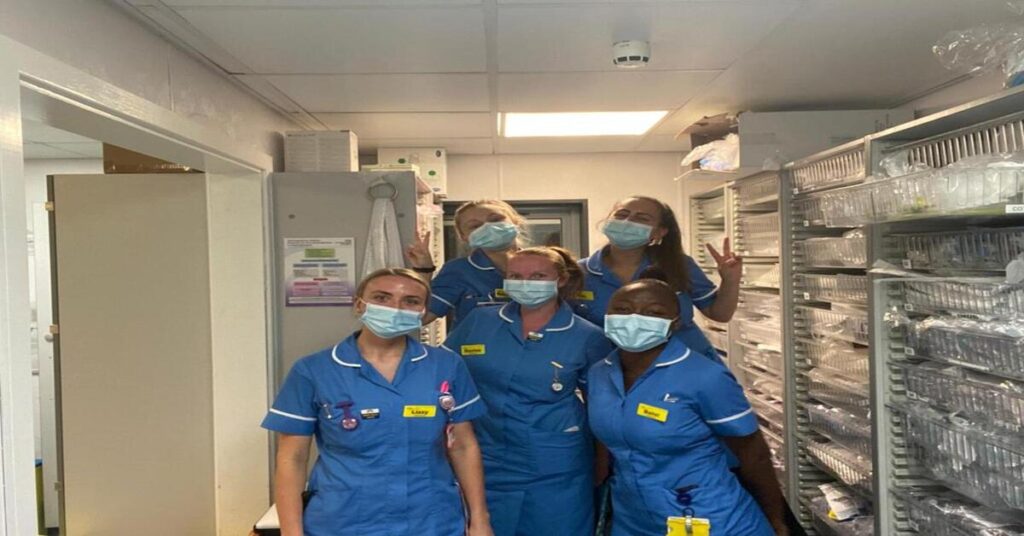Are you interested in moving abroad to work as a nurse in the UK? The UK is one of the most popular destinations for international nurses, offering excellent career prospects, strong professional support, and a clear path to permanent residency.
However, before you can begin, you’ll need to secure professional registration and a valid visa. Most overseas nurses must hold a nursing degree and register with the Nursing & Midwifery Council (NMC) before they can practise in the UK.
Why Work as a Nurse in the UK?
The UK faces an ongoing nursing shortage — projections suggest a gap of more than 140,000 nurses by 2030. To fill this demand, the UK actively recruits qualified nurses from overseas, making this one of the most accessible and rewarding international career moves.
The National Health Service (NHS) is the largest employer in Britain, with over 1.3 million staff, many of whom were trained abroad. Working in the NHS or an approved private healthcare provider offers excellent job security, a competitive salary, and access to long-term career development.
Visa Options for Nurses in the UK
To legally work as a nurse in the UK, you’ll need the correct visa. The main route is the Health and Care Worker Visa, part of the Skilled Worker category.
Health and Care Worker Visa
This visa allows healthcare professionals to live and work in the UK for up to five years and can lead to permanent residency.
To qualify, you must:
- Have a confirmed job offer from an approved NHS trust or private hospital.
- Receive a Certificate of Sponsorship (CoS) from your employer.
- Ensure your job appears on the Health and Care Worker Occupation List.
- Earn a salary that meets the minimum threshold for your role.
- Meet the English language requirement.
Other Routes for Nurses
Some nurses enter the UK through alternative visas, such as:
Graduate Visa – for those who studied nursing or a healthcare-related degree in the UK and wish to remain.
Youth Mobility Scheme Visa – allows citizens of eligible countries aged 18–35 to work in the UK for up to three years.
Required Documents for Your Visa Application
When applying for your visa, you’ll need to provide:
- Certificate of Sponsorship (CoS).
- Proof of English language proficiency.
- Valid passport.
- Evidence of qualifications and NMC registration.
- Proof of sufficient funds (minimum £1,270 if not covered by your employer).
- Details of your employer and sponsorship licence number.
Finding Nursing Jobs in the UK
The easiest way to find nursing vacancies is through NHS Careers, the official government portal for healthcare jobs. You’ll need to create a profile before applying.
Be flexible with your job preferences — location, shift patterns, and speciality areas — as this can help you secure a position faster.
We recommend applying directly to hospitals or NHS trusts rather than through agencies.
Typical shift patterns for UK nurses are 12-hour shifts, either 07:00–19:00 or 19:00–07:00, though managerial staff (Band 6 and above) often work Monday–Friday, 09:00–17:00.
Salary and Career Progression
Most overseas nurses start in the NHS as Band 5 nurses, earning a starting salary of around £31,048 in England and Wales, rising to £33,488 after four years. In Scotland, salaries start slightly higher at £33,247.
Nurses also receive:
- At least 27 days of annual leave plus 8 public holidays.
- Enhanced pay for night, weekend, and bank-holiday shifts.
- Generous maternity and paternity benefits.
As you gain experience, you can move up to Band 6 or Band 7 roles, such as senior staff nurse, ward manager, or specialist nurse.
Permanent Residency for Nurses in the UK
After five years on the Health and Care Worker visa, you can apply for Indefinite Leave to Remain (ILR) — the first step towards British citizenship.
You’ll also need to:
- Pass the Life in the UK Test.
- Meet English speaking and listening standards.
- Show evidence of continuous residence and strong ties to the UK.
Once you hold ILR for 12 months, you can apply for naturalisation as a British citizen.
❓ Frequently Asked Questions
🇬🇧 How can I work as a nurse in the UK?
To work as a nurse in the UK, you’ll need a nursing degree, registration with the Nursing & Midwifery Council (NMC), and a valid visa such as the Health and Care Worker visa.
📋 What are the requirements for international nurses?
You must prove your nursing qualifications, pass an English language test (IELTS or OET), complete the NMC Test of Competence, and have a confirmed job offer from an approved employer like the NHS.
💷 How much do nurses earn in the UK?
Starting salaries for nurses in the NHS (Band 5) begin at around £31,048 per year, increasing with experience. Higher bands and specialised roles can earn £125,000+.
🧳 Do I need sponsorship to work in the UK as a nurse?
Yes, most overseas nurses require employer sponsorship under the Health and Care Worker visa. The NHS and registered private healthcare providers can act as sponsors.
🕒 How long does NMC registration take?
The process usually takes 4–6 months, depending on how quickly you complete your exams and submit documents.
🌍 Can nurses bring their families to the UK?
Yes — dependants (partners and children) can accompany you under the Health and Care Worker visa. They’ll be able to live, work, and study in the UK.
📈 Can working as a nurse in the UK lead to permanent residency?
Absolutely! After five years on the Health and Care Worker visa, you can apply for Indefinite Leave to Remain (ILR) and later for British citizenship.
🏥 Where can I find nursing jobs in the UK?
The best place to start is the NHS Careers website. You can also check local NHS Trust pages or apply directly to hospitals and healthcare providers — no agency required.
🎓 Can new graduates work in the UK as nurses?
Yes. If you’ve recently graduated with a recognised nursing degree and meet the NMC and visa requirements, you can begin your career in the UK as a Band 5 nurse.
Have questions or want help choosing the right visa? Subscribe or explore more articles on UK visas and immigration tips.
Latest Articles
Scotland Two Week Itinerary [2026] Popular 14 Day Car Tour
Planning a two-week trip to Scotland? This Scotland Two Week Itinerary is designed to help you experience the country at a comfortable pace, from historic cities and iconic castles to coastal towns and the dramatic landscapes of the Highlands. It’s ideal for first-time visitors who want to see more than just the headline attractions without […]
Can I Buy a Car on Finance in the UK on a Visa? [2026]: A Guide for New Residents
🚗 Can You Buy a Car on Finance in the UK on a Visa? Relocating to the UK often means starting fresh, a new home, a new job, and new transport needs. For many newcomers, the ability to buy a car on finance in the UK is essential for commuting, family life, and settling in […]
UK Universities Map & Affordable Universities in UK [2026]
If you’re planning to study in Britain, using a UK universities map is one of the best ways to understand where different universities are located and what each region has to offer. Whether you’re comparing campuses in London, Scotland, or the North of England, the map helps you visualise your options before applying. At the […]
How to Get a UK Number [for Work, Study or Travel]
If you’re planning to move to the United Kingdom, one of the first things you’ll need is a UK number. Whether you’re relocating for work, study, or just travelling long-term, having a local number makes everyday life easier, from applying for jobs and renting accommodation to setting up bank accounts and receiving important texts. Getting […]
UK Visitor Visa 180 Days Rule [2026]
The UK Visitor Visa 180 Days Rule is one of the most important things to understand before travelling to Britain. Whether you’re visiting family, exploring the country, or attending business meetings, you need to know how long you can stay, and how the 180-day limit works. This article explains what the 180-day rule means, how […]
Charity Worker Visa UK (2025): How to Apply, Requirements & Sponsorship [Guide]
The Charity Worker visa UK is a temporary visa that allows you to come to Britain to carry out unpaid voluntary work for a registered charity. It’s part of the UK’s Temporary Worker route (previously known as the Tier 5 Charity Worker visa). If you’re looking to gain international experience, support a good cause, or […]
Family Visa UK: Requirements, Costs and How to Apply [2026]
Bringing your loved ones together is one of the most important reasons people apply for a UK visa. The Family Visa UK is designed to let you live in Britain with your partner, children, or parents if they are already settled in the country. For couples, this includes the fiancé visa, spouse visa, and the […]
Working Holiday Visa UK – Planning for 2026 [Guide]
Moving abroad is one of the most exciting adventures you can take, and for many people the United Kingdom is at the top of the list. If you’re between 18 and 30 (soon to be 35 for some countries), the Working Holiday Visa UK, officially known as the Youth Mobility Scheme visa, offers a fantastic […]












Pingback: UK Emigration Process Simplified – Barely Born
Pingback: Top Considerations for UK Emigration
Pingback: What You Need to Know About UK Emigration | Christ Church Guest House
Pingback: Emigrating to the UK: A Complete Overview
Pingback: How to Make Your UK Emigration Journey a Success
Pingback: UK Shortage Occupation List 2025: Key Changes and Implications
Pingback: UK Shortage Occupation List 2025: Addressing Labor Gaps and Economic Needs – My Blog
Pingback: The UK Shortage Occupation List 2025: Insights into the Latest Changes